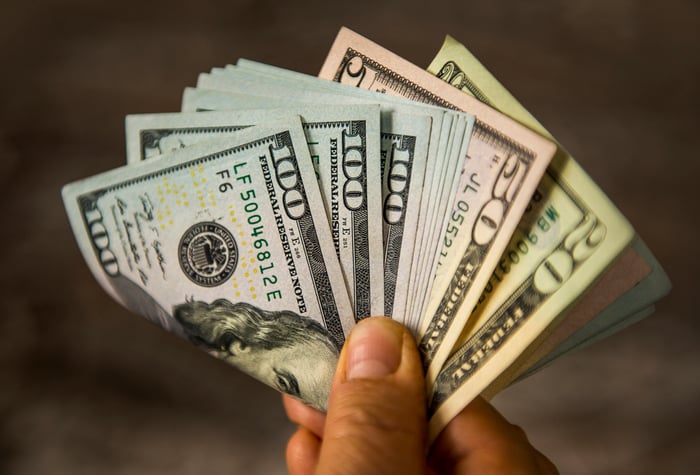For nearly six decades, Berkshire Hathaway (BRK.A -0.30%) (BRK.B -0.26%) CEO Warren Buffett has absolutely crushed Wall Street's benchmark index. Whereas the broad-based S&P 500 produced a 30,209% total return, including dividends paid, between 1964 and 2021, the Oracle of Omaha (as Buffett has come to be known) led Berkshire's Class A shares (BRK.A) to a jaw-dropping gain of 3,641,613% in the same stretch.
Many books have been written extolling the strategies Warren Buffett employs to beat the market. But the Oracle of Omaha's penchant for portfolio concentration might be Berkshire Hathaway's key ingredient.

Berkshire Hathaway CEO Warren Buffett. Image source: The Motley Fool.
Although Berkshire Hathaway has stakes in around four dozen securities, approximately $301.8 billion (85%) of its $353.7 billion in invested assets, as of February 4, 2023, was tied up in just 10 stocks.
- Apple (AAPL 0.52%): $141,402,498,267 (40% of invested assets)
- Bank of America (BAC -1.07%): $37,626,798,579 (10.6%)
- Chevron (CVX 1.04%): $28,761,988,535 (8.1%)
- American Express (AXP -0.84%): $27,117,089,802 (7.7%)
- Coca-Cola (KO 0.31%): $23,932,000,000 (6.8%)
- Kraft Heinz (KHC -0.52%): $12,823,499,133 (3.6%)
- Occidental Petroleum (OXY 0.82%): $11,902,095,046 (3.4%)
- Moody's (MCO -1.58%): $8,001,889,192 (2.3%)
- Taiwan Semiconductor Manufacturing Company (TSM 2.71%): $5,685,362,901 (1.6%)
- BYD (BYDD.F 1.21%): $4,591,243,954 (1.3%)
Why have Warren Buffett and his investment team chosen to pile 85% of Berkshire's invested capital into these 10 stocks? Let's take a closer look.
Profitable, brand-name businesses are worth hanging onto
To start with, the Oracle of Omaha is a big fan of businesses with exceptional branding power that remain profitable in any economic environment. Buffett fully understands that recessions are an inevitable part of the economic cycle. Rather than trying to guess when they'll occur, he hangs onto his stakes in these consistently profitable companies that get to take advantage of expansions that last much longer than recessions.
For instance, Coca-Cola has been a Berkshire Hathaway holding since 1988. Although Coke's high-growth days fizzled out long ago, it's still capable of slowly and steadily moving its profit needle higher. It's one of the most geographically diverse multinational companies, is arguably the most-recognized consumer goods brand globally, and has a marketing team that rarely struggles to connect with consumers of all ages.
Chevron is another good example -- even though it's only been a holding for a little over two years. Though Chevron's upstream drilling assets are exposed to weaker crude oil and natural gas prices during recessions, it's an integrated energy company. In other words, Chevron also operates transmission pipelines, chemical plants, and refineries. This allows it to hedge any energy commodity price weakness and continue to generate abundant cash flow.

Image source: Getty Images.
Warren Buffett loves a hearty capital-return program
One of the easiest ways to get Warren Buffett's attention as a publicly traded company is to return a lot of capital to your investors via share buybacks and dividends. Buffett is a particularly big fan of buybacks, given that they allow investors to sit back and become larger stakeholders in a company without having to lift a finger.
Apple, which accounts for 40% of Berkshire Hathaway's invested assets, is tops in the capital-return department. Over the past 10 years (ended Dec. 31, 2022), the largest publicly traded company in the U.S. repurchased $566 billion worth of its common stock. Not including itself, that's more than the market cap of all but four S&P 500 companies. Apple also doles out $14.6 billion in dividends each year to its shareholders.
Berkshire Hathaway's energy stocks -- Chevron and Occidental Petroleum -- have solid capital-return programs as well. Chevron recently announced plans to repurchase as much as $75 billion of its common stock in addition to paying out close to $11.7 billion in dividends each year.
Meanwhile, Buffett's company is collecting 8% annually on its $10 billion preferred stock position in Occidental Petroleum. After reducing its net debt by approximately $15 billion since March 2021, Occidental has also reignited its share-repurchase program.
The Oracle of Omaha gravitates to financial stocks
Warren Buffett is also a huge fan of financial stocks. As I previously pointed out, since economic expansions last disproportionately longer than recessions, companies involved in banking and payment processing are able to take advantage of lengthy bull markets.
Both payment processor American Express and credit-ratings company Moody's have been longtime holdings for Berkshire Hathaway. This marks the 30th consecutive year of AmEx being a Buffett holding, while Moody's has been a portfolio fixture since 2001.
American Express takes advantage of bull markets by double-dipping. It collects fees from merchants and also acts as a lender, thereby generating both interest income and fees from its predominantly higher-income cardholders. As for Moody's, it has the ability to lean on either its credit-ratings segment or its analytics division, depending on debt demand and economic uncertainty.
And don't forget about Bank of America, which is the second-largest Buffett holding by market value, behind only Apple. Bank of America's management team is enjoying every minute of the Federal Reserve's hawkish monetary policy shift designed to tame historically high inflation. Among big banks, BofA is the most interest sensitive. It's generating billions of dollars in added net interest income every quarter on its outstanding variable-rate loans as interest rates rise. This ramp-up in profits should help it more than offset any loan losses tied to short-term economic weakness.





